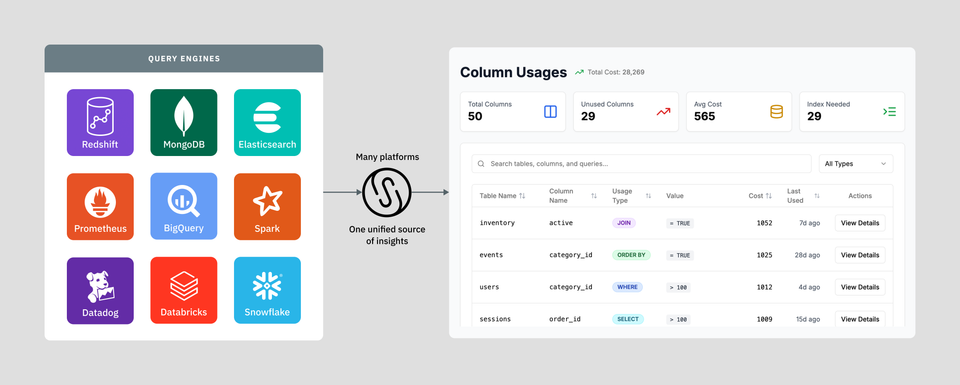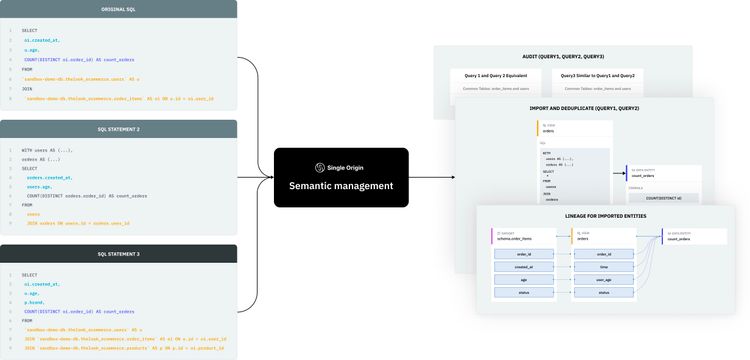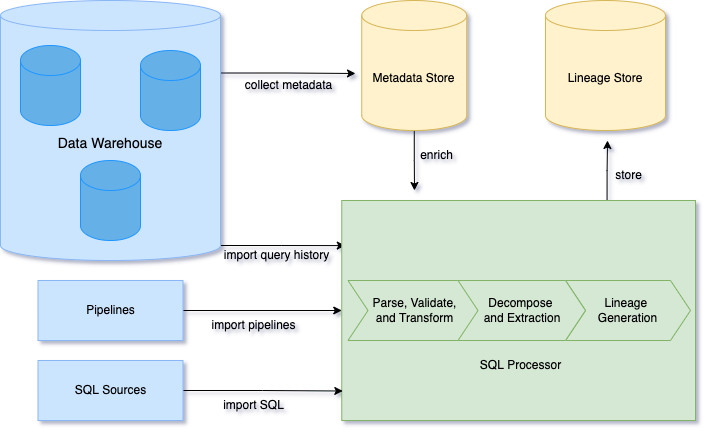Understand and Simplify Data Complexity I: How Column Usage Unlocks Unique Insights

Today, data volume is exploding — along with redundancies, inefficiencies, and rising costs. The shift to multi- and hybrid-cloud environments adds even more friction for critical operations like data quality, governance, and compliance.
At the table level, information is too coarse to address this complexity. Knowing which tables exist or connect does not explain how data is actually used. For example, a table may have hundreds of columns, but only a few drive joins, filters, and aggregations. Without this detail, it is impossible to see where redundancies arise, which fields consume unnecessary storage, or where indexes could improve performance.
Column usage fills this gap. By capturing how each query interacts with individual columns, Single Origin, your enterprise data copilot, transforms raw query activity into actionable insights. This enables teams to simplify complexity with targeted optimizations such as eliminating unused fields, right-sizing storage, and accelerating compute— all with provable accuracy across any cloud platform.
Simplifying complexity starts with column usage
By capturing how each column is actually used—whether it’s filtered, joined, or aggregated—Single Origin uncovers patterns that translate directly into optimizations:
- Storage Savings – Detect unused columns across large datasets and safely drop them, cutting storage and I/O costs.
- Indexing Insights – Identify high-frequency join or filter columns, giving precise guidance on where indexes deliver the biggest impact.
- Materialized View Recommendations – Spot repeated aggregations on large imports and suggest precomputation, drastically reducing compute overhead.
Because Single Origin captures query behavior down to the column level with provable accuracy: 99.9%+, these optimizations are automated, reliable, and directly tied to real workload patterns.
The Technology: Coverage, Accuracy and Actionability
- High Coverage: Every interaction is captured—including joins, filters, window functions, JSON extractions, CTEs, and subqueries—ensuring no part of a query is overlooked.
- High Accuracy: Instead of regex hacks, Single Origin parses every query into an Abstract Syntax Tree (AST)—the same way databases interpret queries. Accuracy is further ensured through iterative grammar refinement based on real-world parsing results, combined with semantic analysis phases that validate and enrich the initial AST. This provides provable, trustworthy column-level usage tracking.
- High Actionability: Usage Insights are surfaced directly in the UI, so table and query owners can optimize their data assets, and exposed via APIs, so platform teams can enrich their own workflows. Beyond raw column usage, Single Origin correlates query stats, cost data, and schema details(e.g. index/cluster keys) to generate meaningful optimization recommendations – going from knowing how columns are used to knowing what actions to take.
The following example query ranks July 2025 sales by region and product category, using a CTE and window function:
WITH monthly_sales AS (
SELECT s.customer_id, s.product_id, s.sales_amount, s.event_timestamp
FROM sales s
WHERE s.event_timestamp >= '2025-07-01'
AND s.event_timestamp < '2025-08-01'
)
SELECT c.region, p.product_category,
SUM(ms.sales_amount) AS total_sales,
RANK() OVER (PARTITION BY c.region ORDER BY SUM(ms.sales_amount) DESC) AS sales_rank
FROM monthly_sales ms
JOIN customers c ON ms.customer_id = c.customer_id
JOIN products p ON ms.product_id = p.product_id
WHERE p.product_category IN ('Electronics', 'Furniture')
GROUP BY c.region, p.product_category
ORDER BY total_sales DESC;Instead of just linking tables, Single Origin detects:
- customer_id → frequent join key, ideal index candidate
- event_timestamp → dominant filter, ideal partitioning candidate
- sales_amount → costly aggregation target
- CTE monthly_sales → reusable intermediate result, candidate for materialization
- Window function RANK() → heavy computation, optimization opportunity if precomputed
- Subquery filter on product_category → selective filter, index candidate
Real-World Impact: From Analysis to Action
- Materialized Views: Repeated aggregations detected → proactive recommendation to precompute results. Dashboards load instantly, and warehouse costs drop. For example, Coinbase partnered with Single Origin for its unmatched accuracy and ability to handle complex queries at scale. By following actionable recommendations like materialized views, Coinbase improved query efficiency and projects a 10–15% reduction in annual Snowflake spend.
- Indexing: Column usage shows customer_id is the #1 join column → build the right index with confidence, cutting query latency drastically.
- Partitioning: 90% of queries filter by event_timestamp → partition by day to prune scans, saving 99% cost.
- Storage Optimization: Usage report shows 50 unused columns in user_profiles → safely drop them, reducing cost and I/O.
- Beyond SQL: Column Usage Analysis isn’t limited to SQL. Single Origin extends the same column-level precision to PromQL, MongoDB, Elasticsearch, BigQuery, Snowflake, Databricks, Spark, and more.
For example, in observability pipelines, a PromQL query like:
sum(rate(http_requests_total{job="api-server", code="200"}[5m])) by (path) is parsed into metrics, filters, functions, and grouping labels—enabling label-level optimization for Grafana dashboards.Conclusion: From Passive to Proactive Data
Column-level usage is more than granularity—it’s a mindset shift.
- From guesswork → to data-backed optimization
- From manual checks → to automated recommendations
- From tribal knowledge → to provable, AST-driven evidence
This is how Single Origin transforms data from a passive asset into an active, controllable resource that continually saves cost, improves performance, and strengthens governance.
Ready to truly understand and master your data? Explore Single Origin today.




